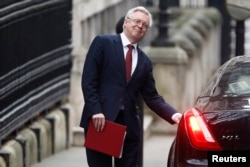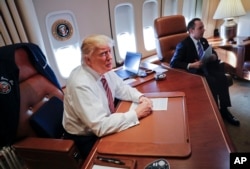Britain's efforts to leave the European Union remained engulfed in acrimony, as the government of Theresa May introduced a bill that would finally allow the nation to trigger the disengagement process.
Members of parliament will have fewer than two weeks to review the law, prompting angry reactions from the opposition Labour Party, which accused May's government of maneuvering to purposely give Brexit opponents insufficient time to derail the legislation.
The law was introduced only two days after Britain's Supreme Court ruled the government needs parliament's approval to invoke Article 50 of the EU treaty and thus trigger the process to leave the 28-nation grouping.
Debate begins at end of January
With a turnout of 72 percent, British voters in June passed a referendum by a 4 percent margin in favor of Brexit. The referendum was advisory and non-binding, enabling opponents to challenge the ability to enforce it in court.
“The British people have made the decision to leave the EU," said Brexit Minister David Davis. “Today we have introduced a bill in parliament which will allow us to formally trigger Article 50 by the end of March,” he said.
The bill introduced Thursday is only two paragraphs long and says the prime minister “may notify, under Article 50 (2) of the Treaty on European Union, the United Kingdom's intention to withdraw from the EU.”
Debate is to begin on January 31, as May tries to meet a March 31 deadline she set to kick off the process, which is expected to take two years.
Little time to debate Brexit
Observers say the bill is expected to pass in the Conservative majority parliament. It would then be signed by Queen Elizabeth.
Labour Party leader Jeremy Corbin has said the opposition will not try to frustrate the aims of Brexit, but that his party will push for changes to the legislation.
With fewer than two weeks to decide on the law, critics of Brexit complain they may not have enough time to make those changes.
“We will have less time to debate the legislation that takes us out of the EU than we did previous European treaties,” Chris Leslie, a Labour Party lawmaker said Thursday.
May addresses Republicans
May touted her vision for a post-EU Britain on a visit Thursday to the United States, where she addressed a welcoming audience of congressional Republicans in Philadelphia.
“We have chosen a different future of our country,” May told congressional Republicans, one that she said restores parliamentary sovereignty and self-determination. She said the British “voted with determination and quiet resolve” and are ready to build relations with old friends.
Praise for Trump
The British prime minister is the first foreign leader to meet with new U.S. President Donald Trump.
May praised the Trump administration, saying she is “delighted” that the new U.S. administration has pledged to make reaching a trade agreement with Britain one of its top priorities.
The U.S. position is a sharp departure from that of former President Barack Obama, who last year warned Britons their country would “go to the back of the queue” on trade deals if they voted to leave the European Union.
May's position appeared bolstered Thursday by figures showing Britain's economy after the Brexit referendum has grown by a robust 0.6 percent in the fourth quarter and 2 percent for the year, making it the fastest-growing economy in the G7 in 2016.






